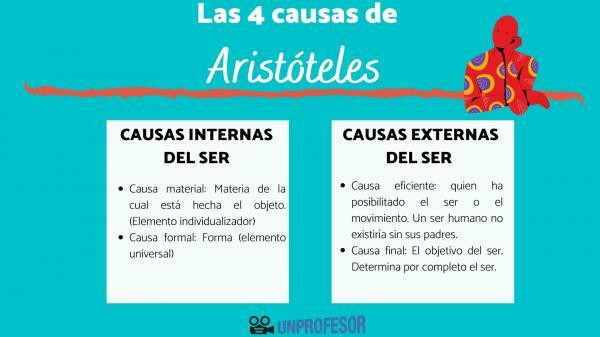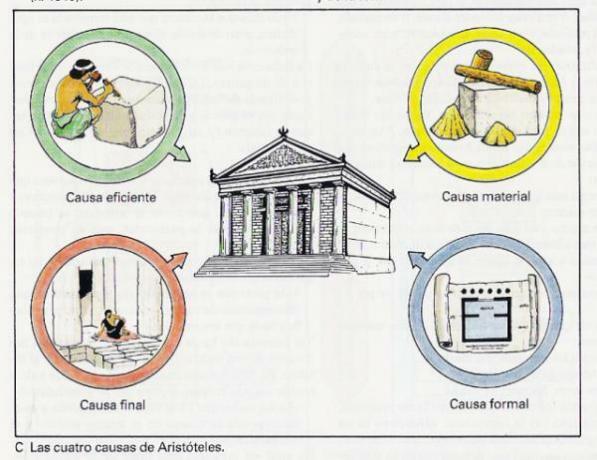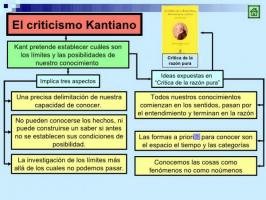Theory of the 4 CAUSES of ARISTOTLE

In this lesson from a TEACHER we explain the Aristotle's theory of the four causes, a philosopher disciple of Plato who tries to answer the problem of change and movement, based on the idea that every effect has its cause. What it is about is to find the reason for being, the why of natural phenomena.
Knowledge is reached through analysis of the causes, that for Aristotle, there were four: material, formal, efficient and final cause, and they can be applied to almost everything. In the Middle Ages, Sto. Thomas, tries to demonstrate the existence of God from the Aristotelian arguments with the exposition of the five ways of him.
If you want to know more about the four causes of Aristotle, keep reading this lesson from a PROFESSOR.
Index
- Summary of the four causes of Aristotle
- Causes of movement and change
- The efficient and final cause of the universe
- The Christian God and the prime mover
Summary of the four causes of Aristotle.
In this lesson we will talk about
the four causes of Aristotle. The concept of causein Aristotle it is very important, since he says that we have causes of our own being, and causes outside our own being are external.Internal causes of being
- Material cause: Matter of which the object is made. (Individualizing element)
- Formal cause: Form (universal element)
External causes of being
- Efficient cause: who has made being or movement possible. A human being would not exist without his parents.
- Final cause: The goal of being. It completely determines being.
As every object that exists has a cause prior to its being, there is no first moment of the universe. The universe exists forever and ever.
If you want to check that you have understood what was explained in today's lesson, you can do the printable exercises with their solutions at the end of the lesson.
Causes of movement and change.
Aristotle is going to explain movement and change from the study of the four causes of Aristotle, since he considers that every effect has its cause and there can be no knowledge without an investigation about its causes. Thus, then, it ensures that there are four causes: the first two intrinsic and the next two extrinsic:
Material cause
Matter determines the appearance of physical objects, which are subject to change. For example, the wood of a table or the marble of a statue.
Formal cause
It consists of the disposition or appearance of the changing things. Continuing with the example of the table, the shape would determine the design of the object.
Efficient cause
It is the agent of change or movement that, although it is apart from things, interacts with them to give them movement. In the case of the table, the carpenter would be the efficient cause.
Final cause
It constitutes the purpose or purpose of the movement. It supposes a change so that the thing becomes what it has to be. A table, to continue in the same line, must fulfill a practical or aesthetic function.
From the four causes, Aristotle wonders why of certain effects. Based on the responses, you can find out how events unfold.
"We believe that we know everything without further ado, but not in a sophisticated, accidental way, when we think we know the cause for which the thing is, which is the cause of that thing and that it cannot be otherwise. "

Image: Aeterna Impero
The efficient and final cause of the universe.
The physics and metaphysics are united in the philosophy of Aristotle, since, the causes that explain the nature and dynamism of the universe, lead to the affirmation of the existence of a first immobile motor, causing all movement. In book VIII of the Physical, the philosopher affirms that there is an immaterial being that causes the physical world, but in Metaphysics he calls God the first motor.
“Life also belongs to God; because the actuality of thought is life, and God is that reality; and the self-dependent actuality of God is the exceedingly good and eternal life. That is why we say that God is a living, eternal, extremely good being; so that life and duration belong continuously and eternally to God; because this is God ”.
This is a concept similar to Nous of Anaxagoras or to Logos from Heraclitus. This prime mover, which is the Aristotelian god, is at the same time efficient cause and final cause, he is not the creator of the world. God, he unifies the multiplicity of natural phenomena.
The first immobile motor is the Aristotelian god
This thinker assures that there is "an immortal, immutable being, ultimately responsible for all fullness and order in the sensible world." The Aristotelian god is immaterial and it cannot be grasped through the senses. It is not the origin of the world, nor does it care about it, since this being, which is pure entelechy, can only think of itself. If it influences natural beings, it is by “aspiration or desire” to imitate the first immobile motor.
“It is clear then that there is no place, no void, no time, outside of heaven. Therefore, everything that is there is of such a nature that it does not occupy any place, nor does time age it; nor is there any change in any of the things that are beyond the outermost movement; they continue throughout their entire duration unaltered and unchanged, living the best and most self-sufficient of lives... [the birth of all heaven] derives being and life than other things, some more or less articulated but others weakly, enjoy ”.
The Christian God and the prime mover.
Saint Thomas of Aquino identifies the first immobile motor with the Christian God. In the Summa Theologiae, try to prove the existence of God through rational arguments, through what is known as the five ways.
[...] In this world there is movement. And everything that moves is moved by another. [...] Similarly, it is impossible for something to move and be moved at the same time, or to move itself. Everything that moves needs to be moved by another. But if what is moved by another moves, it needs to be moved by another, and this by another. This procedure cannot be carried out indefinitely, because the first one who moves would not be reached, and thus no there would be any motor since the intermediate motors only move by being moved by the first motor. [...]. Therefore, it is necessary to reach that first engine that nobody moves. In this, everyone recognizes God.
Everything that moves, says Saint Thomas, is moved by something, which at the same time must remain immobile, since it is not possible to affirm an infinite sequence of causes. And that stationary prime mover, he says, is the Christian God.
If you want to read more articles similar to The four causes of Aristotle, we recommend that you enter our category of Philosophy.
Bibliography
- Gómez-Lobo, A. (1996). Brief exposition of Aristotelian metaphysics. Public Studies, 62, 309-327.
- González, S. S. (2012). Aristotle's philosophy. Madrid: History of Philosophy Series, 12.
- Sánchez, M. M. (2014). Essence and causes in and through natural movements. From Aristotle and in dialogue with Alicia Juarrero. Scientia et fides, 2 (2), 67-92.



